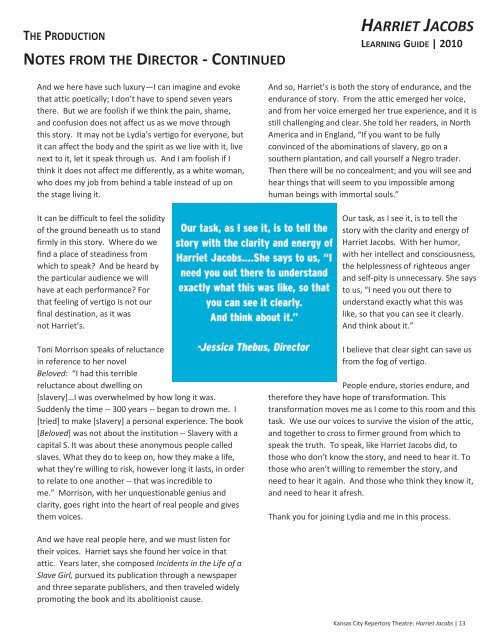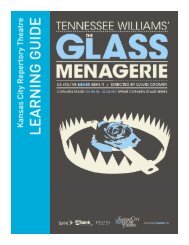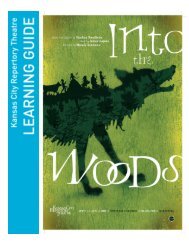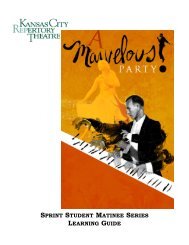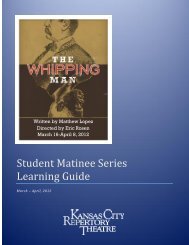Harriet Jacobs - The Kansas City Repertory Theatre
Harriet Jacobs - The Kansas City Repertory Theatre
Harriet Jacobs - The Kansas City Repertory Theatre
You also want an ePaper? Increase the reach of your titles
YUMPU automatically turns print PDFs into web optimized ePapers that Google loves.
THE PRODUCTION<br />
NOTES FROM THE DIRECTOR - CONTINUED<br />
And we here have such luxury—I can imagine and evoke<br />
that attic poetically; I don’t have to spend seven years<br />
there. But we are foolish if we think the pain, shame,<br />
and confusion does not affect us as we move through<br />
this story. It may not be Lydia’s vertigo for everyone, but<br />
it can affect the body and the spirit as we live with it, live<br />
next to it, let it speak through us. And I am foolish if I<br />
think it does not affect me differently, as a white woman,<br />
who does my job from behind a table instead of up on<br />
the stage living it.<br />
It can be difficult to feel the solidity<br />
of the ground beneath us to stand<br />
firmly in this story. Where do we<br />
find a place of steadiness from<br />
which to speak? And be heard by<br />
the particular audience we will<br />
have at each performance? For<br />
that feeling of vertigo is not our<br />
final destination, as it was<br />
not <strong>Harriet</strong>’s.<br />
Toni Morrison speaks of reluctance<br />
in reference to her novel<br />
Beloved: “I had this terrible<br />
reluctance about dwelling on<br />
[slavery]…I was overwhelmed by how long it was.<br />
Suddenly the time -- 300 years -- began to drown me. I<br />
[tried] to make [slavery] a personal experience. <strong>The</strong> book<br />
[Beloved] was not about the institution -- Slavery with a<br />
capital S. It was about these anonymous people called<br />
slaves. What they do to keep on, how they make a life,<br />
what they're willing to risk, however long it lasts, in order<br />
to relate to one another -- that was incredible to<br />
me.” Morrison, with her unquestionable genius and<br />
clarity, goes right into the heart of real people and gives<br />
them voices.<br />
And we have real people here, and we must listen for<br />
their voices. <strong>Harriet</strong> says she found her voice in that<br />
attic. Years later, she composed Incidents in the Life of a<br />
Slave Girl, pursued its publication through a newspaper<br />
and three separate publishers, and then traveled widely<br />
promoting the book and its abolitionist cause.<br />
HARRIET JACOBS<br />
LEARNING GUIDE | 2010<br />
And so, <strong>Harriet</strong>’s is both the story of endurance, and the<br />
endurance of story. From the attic emerged her voice,<br />
and from her voice emerged her true experience, and it is<br />
still challenging and clear. She told her readers, in North<br />
America and in England, “If you want to be fully<br />
convinced of the abominations of slavery, go on a<br />
southern plantation, and call yourself a Negro trader.<br />
<strong>The</strong>n there will be no concealment; and you will see and<br />
hear things that will seem to you impossible among<br />
human beings with immortal souls.”<br />
Our task, as I see it, is to tell the<br />
story with the clarity and energy of<br />
<strong>Harriet</strong> <strong>Jacobs</strong>. With her humor,<br />
with her intellect and consciousness,<br />
the helplessness of righteous anger<br />
and self-pity is unnecessary. She says<br />
to us, “I need you out there to<br />
understand exactly what this was<br />
like, so that you can see it clearly.<br />
And think about it.”<br />
I believe that clear sight can save us<br />
from the fog of vertigo.<br />
People endure, stories endure, and<br />
therefore they have hope of transformation. This<br />
transformation moves me as I come to this room and this<br />
task. We use our voices to survive the vision of the attic,<br />
and together to cross to firmer ground from which to<br />
speak the truth. To speak, like <strong>Harriet</strong> <strong>Jacobs</strong> did, to<br />
those who don’t know the story, and need to hear it. To<br />
those who aren’t willing to remember the story, and<br />
need to hear it again. And those who think they know it,<br />
and need to hear it afresh.<br />
Thank you for joining Lydia and me in this process.<br />
<strong>Kansas</strong> <strong>City</strong> <strong>Repertory</strong> <strong>The</strong>atre: <strong>Harriet</strong> <strong>Jacobs</strong> | 13


